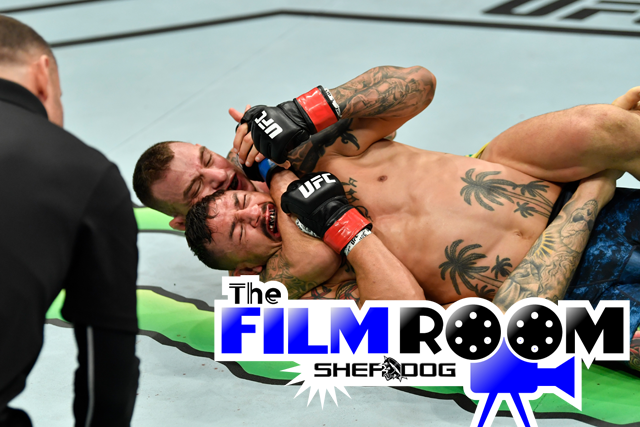The Film Room: Renato Carneiro

Rising featherweight contender Renato Carneiro will face his toughest test to date when he meets former Ultimate Fighting Championship titleholder Jose Aldo in the UFC Fight Night 144 co-headliner on Feb. 2 in Fortaleza, Brazil. “Moicano” has compiled a 5-1 record since joining the UFC in 2014, a July 2017 submission loss to Brian Ortega his only misstep. A convincing victory over Aldo could thrust the 29-year-old into title contention.
Carneiro’s exploits are under the microscope in this edition of The Film Room.
Advertisement
Carneiro’s entire game revolves around his defense, footwork and jab, which means most of his striking is done on the counter. He is one of the tallest and longest fighters in the division and uses his length, along with sound footwork, to keep opponents at bay and set up his counters. “Moicano” is a fairly patient fighter but most of his counters come in the form of multiple-strike combos, not single precision strikes.
Since “Moicano” has a reach that is roughly four inches longer than the featherweight average, his jab is able to land while he is out of range of his opponents’ strikes. He mostly uses his jab on the counter to stifle the opponent’s leading attacks, but he will also use it to set up combos in the rare moments where he is the leading fighter. He will often double up on the jab and even use it to the body. Jabbing the body has never picked up in MMA but has always been prevalent in boxing, with fighters like Floyd Mayweather and Roberto Duran routinely throwing jabs to the body. Carneiro’s liberal use of the jab on the lead and on the counter would surely thrill James J. Corbett if he were alive today.
Oftentimes, defensive footwork is seen as running away from the opponent by fans, but “Moicano” stands as a prime example of the hit-and-not-get-hit philosophy. Carneiro took a lot of heat for his performance against dangerous power puncher Jeremy Stephens, as he spent most of the fight circling away from the Alliance MMA rep’s power hand while picking him apart on the outside. This is the intelligent way to fight someone like Stephens, and “Moicano” used his footwork and lengthy outside game to great effect: Stephens landed a career-low 27 percent of his strikes in their encounter.
Something interesting about Carneiro’s defense is how he uses the clinch to get off the fence. He will dip his head under the opponents’ strikes to get an underhook and use their momentum to turn them around and separate. Carneiro’s footwork and timing are usually good enough to stay off the cage and at a favorable range, but it is nice to see he has a plan if he gets trapped.
“Moicano” is predominantly a striker, but he does have two rear-naked choke submission victories in the UFC and has exceptional scrambling and transitional grappling skills that allow him to get back to his feet when taken down. Carneiro’s only loss came to Ortega in a fight he was winning before foolishly shooting for a takedown and wandering into a guillotine in the third round. Aldo is not as proficient as Ortega on the ground but did start his martial arts career in jiu-jitsu, so it will be interesting to see how both men deal with the grappling exchanges.
Related Articles






